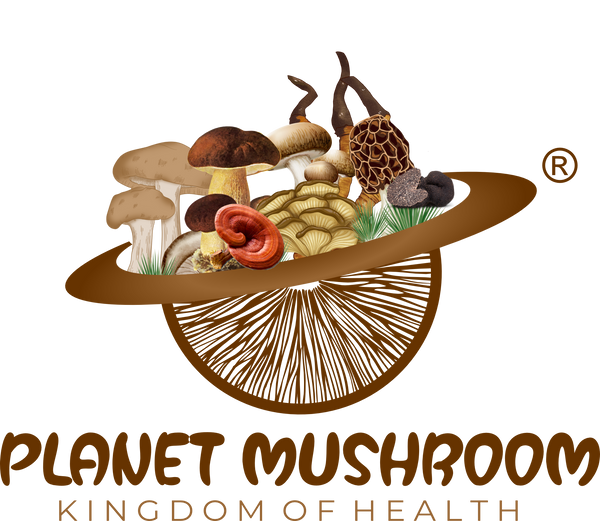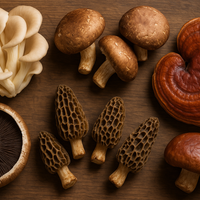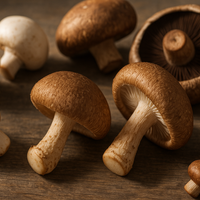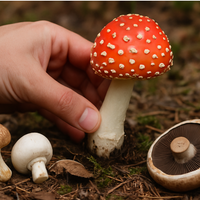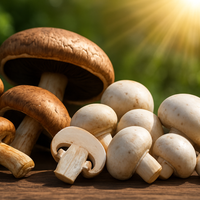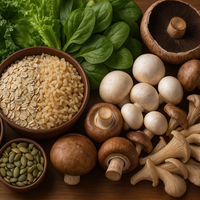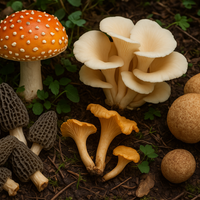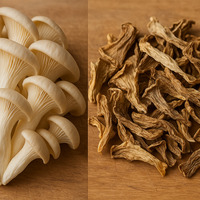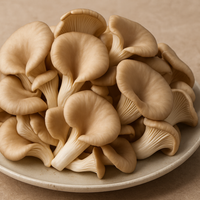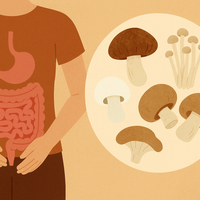
The Science Behind Reishi Mushroom and Longevity
Planet MushroomWhy Is Everyone Talking About Reishi Mushrooms?
In the world of superfoods and adaptogens, the Reishi mushroom (Ganoderma lucidum) stands as a timeless hero. Known as the "Mushroom of Immortality" in Traditional Chinese Medicine, it’s gaining popularity among wellness seekers for one strong reason—longevity.
In this blog, we’ll break down the science behind the Reishi mushroom and its impact on longevity, along with actionable steps on how to integrate this powerful fungus into your routine.
Want to experience these benefits firsthand?
Buy Reishi Mushroom Powder from Planet Mushroom—100% organic, lab-tested, and nutrient-rich.
What is Reishi Mushroom?
Reishi (Ganoderma lucidum) is a woody, bitter-tasting mushroom that grows on decaying trees in Asia. Used in holistic medicine for over 2,000 years, Reishi contains several biologically active compounds that contribute to its reputation as a “longevity mushroom.”
Key Bioactive Compounds in Reishi:
- Triterpenoids—Anti-inflammatory & anti-aging
- Polysaccharides—Immune-enhancing properties
- Peptidoglycans—Support cellular health
These compounds are responsible for many of the science-backed health benefits we’re about to explore.
How Does Reishi Promote Longevity?
1. Boosts Immune Function
Studies show Reishi activates immune responses by increasing white blood cell production and supporting T-cells and NK cells.
➡️ This enhanced immunity is crucial in preventing chronic illness and age-related degeneration.
2. Fights Inflammation & Oxidative Stress
Oxidative stress leads to aging. Reishi contains powerful antioxidants that neutralize free radicals and reduce inflammation.
➡️ This helps your cells age slower and stay healthier longer.
3. Regulates Hormones & Reduces Cortisol
Chronic stress = premature aging.
Reishi is known to reduce cortisol levels, improving sleep and mental calmness—both critical to longevity.
4. Supports Heart Health & Lowers Blood Pressure
Reishi helps reduce LDL cholesterol and normalize blood pressure, lowering the risk of heart disease, the top cause of aging-related death globally.
5. May Enhance Cellular Repair
Emerging studies show that Reishi’s polysaccharides may promote cell regeneration, which is vital for longevity and anti-aging.
How to Use Reishi Mushroom Powder?
It’s not just about what you take—but how you take it.
Recommended Dosage:
- 1–2 grams per day, mixed into tea, coffee, smoothies, or soups
Best Time to Take:
Evening, due to its calming, adaptogenic effects
Pro Tip:
Try it with warm almond milk + cinnamon for a soothing nighttime tonic.
Why Choose Planet Mushroom’s Reishi Powder?
- 100% Organic, No Fillers
- Lab-Tested for Purity
- Sustainably Sourced
- Fine Powder – Easy to Mix
Shop Reishi Mushroom Powder now and start your journey to a healthier, longer life.
Benefits Recap: Why Reishi is a Longevity Powerhouse
| Benefit | Backed by Science? | How It Helps Longevity |
| Boosts Immunity | ✅ | Prevents age-related illness |
| Lowers Stress | ✅ | Improves sleep & hormone balance |
| Reduces Inflammation | ✅ | Protects cells from damage |
| Heart Health | ✅ | Lowers cholesterol & BP |
| Cellular Repair | 🔄 Emerging | Supports anti-aging |
Don’t wait for aging to catch up.
Buy Reishi Mushroom Powder Today
Get long-term wellness in every scoop.
FAQs
Q1. How long does Reishi take to show results?
A: Most users experience benefits within 2–4 weeks of regular use, especially improved sleep and reduced fatigue.
Q2. Is Reishi safe for daily use?
A: Yes. It’s generally safe for daily use in recommended doses. However, consult a doctor if you're pregnant or have a medical condition.
Q3. Can I combine Reishi with other mushrooms?
A: Absolutely. Combining Reishi with mushrooms like Cordyceps or Lion’s Mane can amplify wellness benefits.
Q4. Does Reishi mushroom have side effects?
A: Rarely. Mild digestive upset may occur in sensitive individuals. Start with a small dose.
Q5. Is this product vegan and gluten-free?
A: Yes! Our Reishi Mushroom Powder is 100% vegan, gluten-free, and contains no artificial additives.
